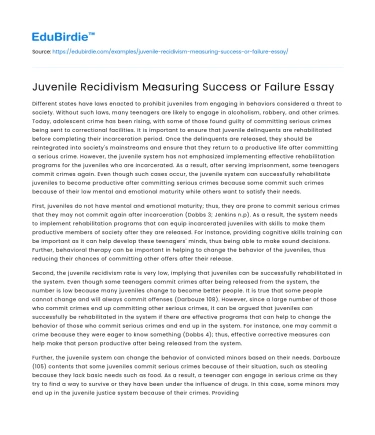Different states have laws enacted to prohibit juveniles from engaging in behaviors considered a threat to society. Without such laws, many teenagers are likely to engage in alcoholism, robbery, and other crimes. Today, adolescent crime has been rising, with some of those found guilty of committing serious crimes being sent to correctional facilities. It is important to ensure that juvenile delinquents are rehabilitated before completing their incarceration period. Once the delinquents are released, they should be reintegrated into society's mainstreams and ensure that they return to a productive life after committing a serious crime. However, the juvenile system has not emphasized implementing effective rehabilitation programs for the juveniles who are incarcerated. As a result, after serving imprisonment, some teenagers commit crimes again. Even though such cases occur, the juvenile system can successfully rehabilitate juveniles to become productive after committing serious crimes because some commit such crimes because of their low mental and emotional maturity while others want to satisfy their needs.
First, juveniles do not have mental and emotional maturity; thus, they are prone to commit serious crimes that they may not commit again after incarceration (Dobbs 3; Jenkins n.p). As a result, the system needs to implement rehabilitation programs that can equip incarcerated juveniles with skills to make them productive members of society after they are released. For instance, providing cognitive skills training can be important as it can help develop these teenagers' minds, thus being able to make sound decisions. Further, behavioral therapy can be important in helping to change the behavior of the juveniles, thus reducing their chances of committing other offers after their release.
Save your time!
We can take care of your essay
- Proper editing and formatting
- Free revision, title page, and bibliography
- Flexible prices and money-back guarantee
Second, the juvenile recidivism rate is very low, implying that juveniles can be successfully rehabilitated in the system. Even though some teenagers commit crimes after being released from the system, the number is low because many juveniles change to become better people. It is true that some people cannot change and will always commit offenses (Darbouze 108). However, since a large number of those who commit crimes end up committing other serious crimes, it can be argued that juveniles can successfully be rehabilitated in the system if there are effective programs that can help to change the behavior of those who commit serious crimes and end up in the system. For instance, one may commit a crime because they were eager to know something (Dobbs 4); thus, effective corrective measures can help make that person productive after being released from the system.
Further, the juvenile system can change the behavior of convicted minors based on their needs. Darbouze (105) contents that some juveniles commit serious crimes because of their situation, such as stealing because they lack basic needs such as food. As a result, a teenager can engage in serious crime as they try to find a way to survive or they have been under the influence of drugs. In this case, some minors may end up in the juvenile justice system because of their crimes. Providing effective counseling and addressing the issues of such juveniles can successfully rehabilitate to become productive members of society.
In conclusion, juvenile justice systems can successfully rehabilitate teenagers who commit serious crimes to become productive individuals in society. Juveniles can commit crimes because they intend to try something as their mental and emotional maturity is low. They can also commit crimes because of their situations, such as when under the influence of drugs or when they want to certain some of their needs. The rate of juvenile recidivism is very low, indicating that if the system can implement effective programs, it can successfully rehabilitate juveniles who commit serious crimes.






 Stuck on your essay?
Stuck on your essay?

